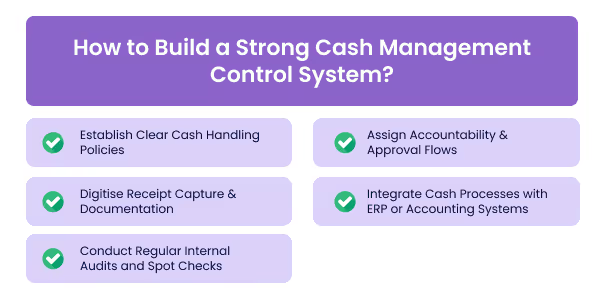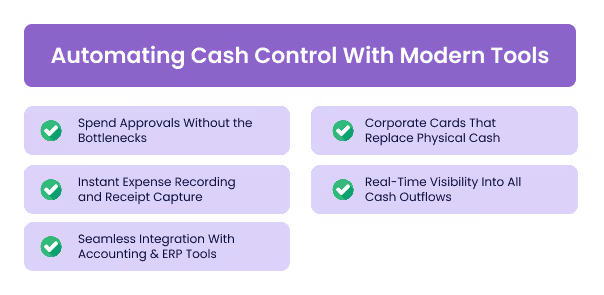For businesses operating in the UAE, the need for strong cash governance has intensified. With the introduction of corporate tax, evolving VAT regulations, and increasing scrutiny from regulatory authorities, the cost of mismanaging cash is rising. Even minor lapses—like missing documentation or delayed reconciliations—can trigger audit flags, denied tax deductions, or reputational damage.
Globally, poor cash management contributes to billions in annual losses due to fraud, leakages, and inefficiencies. In the UAE, businesses that lack systemised cash controls risk falling behind—not only in compliance but in financial agility and investor confidence.
This blog explores how UAE-based companies can build and implement an effective cash management control system, what internal control measures are essential, and how digital tools can simplify everything from policy enforcement to real-time visibility.
Key Takeaways
- A cash management control system helps UAE businesses govern how cash is handled, tracked, and reconciled—ensuring compliance, reducing risk, and increasing financial transparency.
- The four essential internal control measures for cash are:
- Segregation of Duties
- Authorisation & Approval Controls
- Documentation & Record-Keeping
- Reconciliation & Reporting
- Without these controls, businesses risk VAT disallowances, corporate tax penalties, and weakened audit readiness under UAE law.
- Modern tools like Alaan’s spend management platform automate approvals, digitise receipts, and replace physical cash with controlled prepaid cards—all synced to ERP for real-time visibility.
- Strengthening cash controls is no longer a finance task—it's a strategic imperative for growth, governance, and investor confidence.
What Is a Cash Management Control System?
A cash management control system is a structured framework that governs how an organisation handles, tracks, secures, and reconciles its cash transactions. It ensures that every cash inflow and outflow—whether digital or physical—is recorded accurately, approved appropriately, and aligned with internal policies and external regulations.
Unlike general cash management, which focuses on forecasting and liquidity planning, a cash management control system is all about control—ensuring that cash movements are authorised, documented, and compliant.
Key Components Typically Include:
- Defined policies for handling cash, reimbursements, and payments
- Segregation of duties to prevent fraud and error
- Real-time expense tracking and reconciliation
- Secure storage or digital alternatives (like prepaid cards)
- Documentation workflows to retain audit-ready records
Why This Matters in the UAE:
- With Federal Decree-Law No. 47 of 2022 and mandatory record retention rules, undocumented or misclassified cash spend can lead to VAT disallowance, corporate tax exposure, and non-compliance fines.
- A robust system protects against internal fraud, ensures financial discipline, and simplifies audit readiness.
A modern control system is no longer a “nice to have”—it’s the backbone of scalable, compliant finance operations.
What Are the Key Internal Control Measures for Cash?

Internal controls are the safeguards that keep your cash secure, compliant, and traceable. For UAE-based finance teams, understanding and implementing these controls isn’t just good practice—it’s essential for audit preparedness, tax alignment, and operational integrity.
Here are the four key internal control measures for cash that every business should have in place:
1. Segregation of Duties
No single person should control every aspect of a cash transaction—from request to approval to disbursement. This reduces the risk of fraud and errors.
Best Practice:
- One person initiates the payment request
- A second person reviews and approves it
- A third executes the transaction or maintains custody
- Approvals should be role-based and documented in the ERP or spend platform
In Alaan’s platform, custom workflows help automate this process by assigning roles, enforcing multi-level approvals, and reducing the chances of collusion.
2. Authorisation and Approval Controls
Cash transactions—especially those outside regular POs—must be reviewed against pre-defined limits and policies before funds are released.
Best Practice:
- Set transaction caps by employee, department, or category
- Use pre-approval workflows for exceptional or out-of-policy spends
- Configure merchant restrictions for digital cash equivalents (e.g., corporate cards)
This ensures every dirham spent is pre-approved, helping you avoid policy violations and improve budget accuracy.
3. Accurate Documentation and Record-Keeping
Every cash-related transaction should be backed by receipts, invoices, or supporting memos that clearly define the purpose, amount, and beneficiary.
Best Practice:
- Digitise receipts at the time of transaction
- Use OCR and auto-tagging to categorise spend
- Maintain transaction-level audit trails for 5+ years (per UAE tax law)
With Alaan, receipts are uploaded via mobile and automatically linked to the transaction, reducing documentation gaps and ensuring VAT recoverability.
4. Reconciliation and Reporting
Regular reconciliation ensures your physical or digital cash balance matches the accounting records. Discrepancies, if any, must be flagged and resolved quickly.
Best Practice:
- Reconcile petty cash or digital spend weekly or bi-weekly
- Use dashboards to monitor cash burn, pending approvals, and exceptions
- Set alerts for unreconciled balances or threshold breaches
Real-time dashboards in modern spend platforms allow finance leaders to track activity without waiting for month-end reports.
Why Cash Management Controls Matter in the UAE
In the UAE’s rapidly evolving regulatory environment, cash management controls are no longer optional—they’re foundational to financial stability, compliance, and long-term growth.
1. Regulatory Risk: VAT, Corporate Tax & Record-Keeping Mandates
Under Federal Decree-Law No. 47 of 2022, UAE businesses are now subject to corporate tax, with strict requirements around documentation, expense categorisation, and record retention. Add to that VAT obligations, and the cost of loose or undocumented cash handling becomes significant.
Common risks from weak cash controls:
- Denied VAT refunds due to missing or invalid receipts
- Disallowed corporate tax deductions for undocumented business expenses
- Exposure to audit penalties due to lack of audit trails or inconsistent entries
Even small expenses—like petty cash reimbursements or taxi fare claims—can trigger compliance issues if not properly recorded, approved, and stored.
2. Financial Agility and Working Capital Visibility
Cash that isn’t tracked properly is often cash that’s wasted. Without clear visibility into how cash is being spent—across branches, departments, or field teams—businesses risk:
- Overlapping payments
- Unauthorised disbursements
- Missed opportunities to allocate capital more efficiently
A proper cash management control system gives finance teams real-time insight into where cash is going, allowing for better working capital forecasting, liquidity planning, and faster decision-making.
3. Stakeholder Confidence and Governance
Investors, auditors, and leadership teams expect transparent, well-governed financial operations. Inconsistent or manual cash practices raise red flags—especially in industries like professional services, construction, logistics, or government contracting where audits and due diligence are frequent.
Tight controls around cash handling demonstrate that the business is:
- Governance-focused
- Proactive in risk management
- Ready for audits or fundraising conversations
Summary:
In the UAE, strong cash controls are about more than regulatory checkboxes—they’re a strategic shield against compliance risks, a driver of cash efficiency, and a critical pillar of financial governance.
How to Build a Strong Cash Management Control System

Creating a robust cash management control system doesn’t require complex infrastructure or heavy manual oversight. What it does require is clarity, consistency, and the right digital foundation. For UAE businesses, aligning with VAT and corporate tax laws makes these controls even more essential.
Below are the key steps to design and implement a practical, compliant, and scalable control system:
1. Establish Clear Cash Handling Policies
Every business should start with written policies that define:
- What types of expenses can be paid via cash (or corporate cards)
- Who is authorised to request, approve, and reconcile cash disbursements
- Daily or transaction-level cash limits
- Required documentation for each type of spend
These policies should be shared with all employees and reinforced regularly.
UAE context: Ensure the policy explicitly addresses VAT-compliant documentation and retention of records for at least 5 years (as required under UAE tax law).
2. Assign Accountability and Approval Flows
Segregation of duties needs to be mapped into workflows. This means clearly designating:
- Custodians of cash (or card funds)
- Approvers for expense requests or reimbursements
- Finance team roles responsible for reconciliation and reporting
This structure reduces risk and ensures transparency across departments.
Pro Tip: Use digital workflows to auto-route approval based on roles, amounts, and categories.
3. Digitise Receipt Capture & Documentation
Manual paperwork is error-prone and rarely audit-ready. Instead, digitise at the source:
- Require real-time receipt uploads (via mobile or desktop)
- Use OCR (Optical Character Recognition) to auto-tag receipts and capture VAT fields
- Ensure receipts are linked to specific transactions and approval logs
This reduces the risk of lost receipts and supports accurate VAT recovery.
4. Integrate Cash Processes with ERP or Accounting Systems
Once approvals are in place and receipts are collected, the next step is syncing:
- All transactions should flow directly into your ERP/accounting software
- Journal entries should be automatically coded with the correct GL categories
- VAT and tax labels should be auto-populated to avoid manual input errors
Integration ensures a single source of truth—from spend to compliance.
5. Conduct Regular Internal Audits and Spot Checks
Even with automation, controls need to be verified regularly. Schedule:
- Monthly or bi-weekly reconciliation of petty cash, card usage, and advances
- Randomised checks on receipts and policy adherence
- Quarterly reviews of workflows and cash usage trends
Use audit findings to refine policies, train staff, or tighten approval limits.
Automating Cash Control With Modern Tools

For finance teams in the UAE, manual cash handling isn't just inefficient—it’s risky. Physical receipts get lost, approvals get delayed, and reconciling accounts at month-end becomes a nightmare. Enter automation: the smarter, faster, and more compliant way to manage cash controls at scale.
Here’s how automation transforms each layer of a cash management control system:
1. Spend Approvals Without the Bottlenecks
Automated workflows route expense requests to the right approvers instantly—based on employee role, spend category, or amount. No more email trails or delayed approvals.
Benefit:
- Speeds up processing
- Ensures pre-spend policy compliance
- Reduces scope for unauthorised disbursements
2. Corporate Cards That Replace Physical Cash
Prepaid corporate cards eliminate the need to disburse cash manually. These cards can be issued to specific departments or employees with:
- Custom spend limits
- Merchant category restrictions
- Real-time spend visibility
UAE advantage: You control exactly where and how company money is spent—helping prevent VAT-ineligible or policy-violating purchases.
3. Instant Expense Recording and Receipt Capture
Modern platforms allow employees to:
- Snap a picture of their receipt via mobile
- Auto-upload it with VAT details extracted via OCR
- Get reimbursed (or logged) only when the data matches policy rules
Benefit:
- Full audit trail
- Instant data availability
- Less dependency on manual input
4. Real-Time Visibility Into All Cash Outflows
Dashboards give finance leaders a complete picture of:
- Approved vs. pending expenses
- Budget utilisation by department
- Unreconciled balances and exceptions
This supports proactive decision-making—not reactive catch-up at month-end.
5. Seamless Integration With Accounting & ERP Tools
Most spend automation platforms integrate directly with:
- ERP systems (e.g., Zoho, QuickBooks, Tally, SAP)
- Banking APIs
- VAT/tax reporting modules
Benefit:
- Automatic journal entries
- Clean audit trails
- Faster close cycles
In short, automation eliminates the delays, risks, and manual errors that traditionally plagued cash control—while improving compliance, traceability, and financial clarity.
How Alaan Simplifies Cash Management Control
For UAE-based businesses navigating complex compliance requirements, cash flow volatility, and internal fraud risks, Alaan offers a purpose-built platform that replaces outdated manual cash processes with real-time, policy-driven control.
Whether you're managing team reimbursements, vendor payouts, or branch-level operational spending, here’s how Alaan supports a stronger, smarter cash management control system:
Prepaid Corporate Cards with Built-in Rules
Issue reloadable corporate cards to employees, departments, or projects. Set granular controls by:
- Spend category
- Merchant type
- Daily/weekly/monthly limits
- Currency and location
Result: No out-of-policy spending, no manual reimbursements, and real-time visibility into every transaction.
Automated Spend Workflows
Alaan routes expenses through multi-level approval workflows based on your internal structure.
No emails. No delays. No ambiguity.
Result: Every cash-equivalent transaction is pre-approved, logged, and matched against budgets—automatically.
Real-Time Reconciliation & ERP Sync
Transactions flow into your ERP (e.g., Zoho, QuickBooks, Tally) with the correct chart-of-accounts, tax tags, and cost centres.
Automatic reconciliation eliminates end-of-month surprises.
Result: Faster closing cycles, stronger compliance posture, and audit-ready books.
Digital Receipts + OCR
Employees snap receipts via mobile, which are:
- Digitised instantly
- Matched to the transaction
- Stored for long-term audit compliance (aligned with UAE tax retention rules)
Result: No more chasing paperwork or losing VAT recoverability due to missing proof.
Live Dashboards & Spend Analytics
Finance teams gain full visibility into:
- Budget burn by team or location
- Exceptions or pending reconciliations
- Non-compliant or delayed transactions
Result: You control cash outflows proactively—not retroactively.
Alaan isn’t just a spend solution. It’s a cash governance tool designed for modern finance leaders who need accuracy, speed, and compliance at scale.
Final Thoughts
In a region where regulatory oversight is increasing and business agility hinges on financial discipline, implementing a cash management control system is no longer optional—it’s foundational.
Whether you’re navigating VAT audits, corporate tax compliance, or simply trying to scale without financial blind spots, the right controls around cash can unlock major advantages: better visibility, reduced risk, and faster decision-making.
With clearly defined policies, automation, and accountability, finance leaders can shift from chasing receipts to confidently leading growth.
At Alaan, we empower UAE businesses to replace outdated, fragmented cash handling with automated spend controls, real-time reporting, and audit-ready compliance—all in one platform.
From prepaid corporate cards to ERP-synced expense automation, we help you enforce cash policies without the manual effort.
Book a free demo to see how Alaan can help you build a modern cash management control system tailored to your operations and regulatory environment.
Frequently Asked Questions (FAQs)
Q.1 What are the biggest risks of not having a cash management control system?
Poor controls can lead to fraud, policy violations, denied tax deductions, misclassified expenses, and regulatory penalties. In the UAE, businesses may also face compliance issues under VAT or Corporate Tax Law due to missing audit trails.
Q.2 How can small businesses implement effective cash controls without a full finance team?
By using digital spend management platforms with built-in policies, approval workflows, and automated reconciliation. Prepaid corporate cards with limits and real-time tracking eliminate the need for manual petty cash processes or spreadsheets.
Q.3 Are corporate cards considered part of a cash control system?
Yes. When issued with predefined limits, merchant restrictions, and expense rules, prepaid corporate cards offer a secure and traceable alternative to physical cash. They reduce risk while ensuring every spend is policy-compliant.
Q.4 How often should cash accounts be reconciled?
Ideally, petty cash and digital spend accounts should be reconciled weekly or bi-weekly to avoid discrepancies and maintain accurate reporting. For high-volume organisations, daily reconciliation using automated tools is recommended.
Q.5 Why are cash controls so critical in the UAE?
Due to evolving VAT, corporate tax, and audit mandates, businesses in the UAE face steep penalties for poor record-keeping or unapproved cash spend. Without proper controls, they risk losing tax deductions and failing audits.
Q.6 How do prepaid corporate cards improve cash control?
Prepaid cards eliminate the need for physical cash, allowing businesses to set spend limits, merchant rules, and real-time approvals. Tools like Alaan offer full visibility into each transaction, automate receipt tracking, and sync data directly with ERP systems.


.avif)







%201.avif)